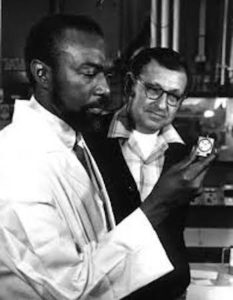
James A. Harris
*James Harris was born on this date in 1932. He was a Black nuclear chemist who discovered elements 104 and 105 (rutherfordium and dubnium).
James Andrew Harris was born in Waco, Texas. His parents divorced when he was young, after which he moved to Oakland, California, with his mother and finished high school. Harris met his wife Helen at Huston-Tillotson College, where they completed their undergraduate studies; they were married in 1957 and had five children: Cedric, Keith, Hilda, Kimberly, and James II. Between his graduation from college and his marriage, Harris served in the Army. His hobbies included golf, traveling, and community activities.
In 1955, after the military, job hunting in STEM-related fields was difficult in the Jim Crow South. Most employers not only refused to hire Harris, but they were also shocked he would even apply as an African American for a job in chemistry. While many chemists have been involved in developing the periodic table, some stand out more than others. Harris was the first Black to contribute to discovering a new element. Harris’ discoveries occurred in the late 1960s, long after Mendeleev published the first periodic table in 1869.
Harris's first chemical research job was at Tracerlab Inc. in Richmond, CA. He was a radiochemist; he worked there for five years. Afterward, Harris left Tracerlab Inc. to work in the Nuclear Chemistry department of the Lawrence Radiation Laboratory at the University of California-Berkeley, working on the isotope division. 1975 Harris received a master's degree in public administration from California State University, Hayward. In 1977, Harris was promoted to head of the Head of Engineering and Technical Services Division at Lawrence. Harris worked in the Heavy Isotopes Production Group. His job was to design and purify targets that would be used to discover elements 104 and 105. These targets needed minimal impurities of elements such as lead to work.
Harris' colleagues praised his work, saying it was high quality and good for elemental research. Two research teams were simultaneously working to discover elements 104 and 105. One was Harris's team at the University of California-Berkeley, and the other was a team of Russian scientists. Both teams successfully isolated the two elements around the same time, so there is a dispute over which team was the first to isolate the elements. To ease the dispute, element 104 was given the name suggested by the American research team, rutherfordium, after the influential British physicist. Element 105 was subsequently given dubnium, representing the city where the Russian team worked. He retired from his work in the lab in 1988.
Harris was awarded an honorary doctorate from Huston-Tillotson College in 1973 for his co-discovery of Rutherfordium and Dubnium. He was also a member of the Kappa Alpha Psi fraternity. James A. Harris, known for being the first Black to contribute to the discovery of new periodic chart elements, died of a sudden illness on December 12, 2000.